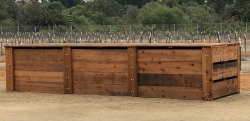Mid-Scale Composting
Mid-scale composting occurs where there is a greater volume of materials than residential composting, but less than a large, permitted composting facility. It is popular at schools, farms, ranches, and community gardens. Mid-scale composting is also popular for those who own several horses as a way to manage manure. Finished compost can be applied to gardens and crops, used to combat erosion, as a component of a stormwater prevention plan, or sold/given away (permits may be required).
In the unincorporated regions of San Diego County permitting
requirements differ depending on the volume and types of materials to
be composted, if the materials are generated onsite, and if the
finished compost will be used onsite or sold. Additionally, the Watershed Protection Program has created several
manuals to assist with composting commercial and agricultural
materials.

- Windrows (pictured left) are often used in composting and are simply large quantities of material in long rows. Mechanical windrow turners are available for purchase, but you can use anything to turn your pile including bulldozers, front and back loaders, and/or tractors with attachments.

- An aerated static pile (pictured right) is a form of composting where air is pumped into the pile, to give the microbes oxygen without having to turn. Windrows can also be aerated to avoid the need for turning.
- A passively aerated system is a form of composting where the air is passively sucked into the pile instead of mechanically pumped in. Warm air raises from the center of the pile causing a vacuum to suck in fresh air and oxygen.

- Multi-bin systems (pictured left) hold compost at multiple stages during the process. One bin is for adding new materials, another is for finishing compost, and the third is for curing compost.
- Vermicomposting can also be scaled up. Vermicomposting is an alternative form of composting where you rely on Red Wiggler worms to covert food scraps and other organic materials into worm castings (a rich soil amendment). This is ideal if you are looking to compost mostly food scraps and/or manure, with little to no yard trimmings.
Free Technical Assistance
The County offers free recycling and composting technical assistance to farms, schools, and businesses upon request. Please contact Recycle@sdcounty.ca.gov for more information. Composting education and assistance with compost and/or worm bin set up, and in some cases donation of bins, is available for schools located in the unincorporated county. Please contact the Solana Center for Environmental Innovation at (760) 436-7986 ext. 700 for more information.
Have a recycling question? Email Recycle@sdcounty.ca.gov or call:






